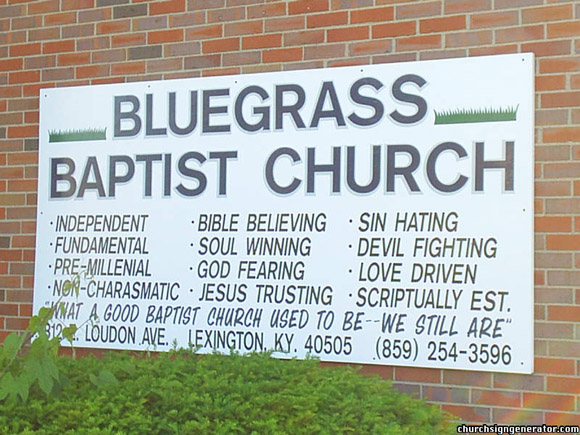A few weeks ago, during a visit to a local church, a deacon at that church cornered me and asked me one of those questions you know immediately is “loaded.†Loaded questions are tricky to respond to honestly given that you never know what local landmine you may be stepping on. One vague or misspoken reference and you may find yourself immediately recruited as an endorser of one or several anxious camps in an ideological battlefield you know nothing about.

Bluegrass Baptist Church, KY. No bait-and-switch here.
But the question posed to me by this eager deacon is one I’ve heard before. In fact, I’d heard it several times recently—it must be the question of the month. The question had to do about whether or not having the name of the church’s denomination on its signage is a potential put-off for prospective members. You know where that kind of question most likely comes from: anxiety issues about numbers and/or finances. And there are any umber of congregations that have dropped denominational identifiers as part of their strategic approach to “reaching†potential members or target groups. You’ve probably got a few in your neighborhood, their names running the gamut from clever to cryptic (in my area we have The Church On the Way and Vantage Church).
My response to that kind of question is three-fold. I usually ask, first, “And what’s the theology behind not putting your denominational affiliation on your signage?†Too many decisions in congregations are made from a pragmatic or marketing standpoint than from a theological or doctrinal position. Second, I raise the issue of identity integrity. If your congregation is Baptist, Methodist, Church of God, or whatever, why are you reluctant to identify yourself as such? I often suspect that congregations that “hide†their denominational affiliation are engaging in a type of marketing bait-and-switch tactic for the sake of a larger “market share’ in potential members (in other words, I think there’s something to be said for corporate self-definition). Third, my closing statement is along the line of, “I don’t really think what you call yourself really matters as much as how relevant you are, as a congregation, in the life of your members, prospective members, and in your neighborhood.â€
At one church consultation where the question of whether to change or keep the name of the church (and drop the denominational identification) I shared the following list as a way to begin that discussion with some humor. Reading over the list, maybe I’m wrong about my third point, maybe it does matter what you call yourself.
Here is a list of actual church names:
- Halfway Baptist Church
- Useful Baptist Church (no longer active, but an antique store)
- Hell Hole Swamp Baptist Church, South Carolina
- Faith Free Lutheran
- Little Hope Baptist Church
- Original Church of God, Number 2
- Boring Seventh Day Adventist Church
- Harmony Baptist Church, East Texas (1/2 mile away Harmony Baptist Church #2)
- Battle Ground Baptist Church
- The Big Apple Chapel
- Martyr’s Memorial Fundamental Baptist Church
- Waterproof Baptist Church. Louisiana
- Why Not Wesleyan Church. North Carolina
- No Hope United Methodist Church. Mississippi
- Country Club Christian Church. Kansas City
- James Bond United Community Church in Toronto
- First United Separated Baptist Church. Indiana
- Hell For Certain. Kentucky
- No-Name-Yet Presbyerian Church. Smyma, TN
- The Happy Church. Denver, CO
- Thank you church, Japan (Arigato Kyokai)
- New Paradigm Christian Church. Indianapolis, IN. (Slogan: “Not the church you grew up in.”)
- The King’s Dome (near Portland OR in Washington state)
- Hell Seventh Day Adventist
- St. Martini Lutheran Church
- Lover’s Lane Episcopal Church.
On a related topic, here’s a link to church signs and their sometimes creative messages.


1 Response to What’s in a name?